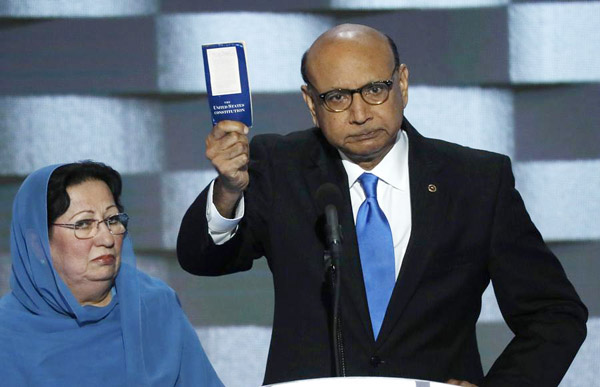 |
|
Khizr Khan, whose son, Humayun S. M. Khan was one of 14 American Muslims who died serving in the US Army in the 10 years after the 9/11 attacks, offers to loan his copy of the Constitution to Republican U.S. presidential nominee Donald Trump, as he speaks while a relative looks on during the last night of the Democratic National Convention in Philadelphia, Pennsylvania, US July 28, 2016.? [Photo/Agencies] |
WASHINGTON - In a growing dispute between Donald Trump and the parents of a Muslim US Army officer killed in the Iraq war, the father said on Monday that the Republican presidential nominee lacked the empathy to be a leader and chided him for throwing the first salvo in their exchange.
Trump responded simultaneously on Twitter to Khizr and Ghazala Khan's morning television appearances, saying he was being "viciously" attacked.
Asked on CNN what message he could give Trump, Khizr Khan said he wanted to maintain his family's dignity and convey to Trump "that a good leader has one trait ... empathy."
"It is basic character, realizing, feeling the pains, the difficulties of the people that you wish to lead," Khan said. "And that is missing."
The issue has dominated the election campaign in recent days after Khan spoke at the Democratic National Convention on Thursday night, with his wife standing at his side.
The Khan's son, Army Captain Humayun Khan, was killed by a bomb in Iraq in 2004, and the father spoke emotionally of the sacrifice his son had made for the country as an American Muslim, specifically criticizing Trump's proposal to ban Muslims from entering the country.
In response to the speech, Trump said Ghazala Khan might not have been "allowed" to speak, implying her silence reflected restrictions placed on women by some traditional Muslims.
"There was no need to comment the way he commented," Khan said on Monday. "That initiated this conversation."
Ghazala Khan wrote an opinion piece in the Washington Post on Sunday saying that she had remained silent during her husband's remarks to cope with making her grief public during the convention.
The parents have appeared on television numerous times over the weekend and several leading Republicans have weighed in to express support for the family and to honor their sacrifice.
The dispute is the latest in a series of missteps by the freewheeling, unorthodox campaign of Trump, a New York businessman who has never held elected political office but who beat 16 rivals to become the Republican presidential nominee for the Nov. 8 election. He has made some deeply controversial campaign proposals, including the ban on Muslims and building a wall along the Mexican border to keep out illegal immigrants.
In interviews on Monday, the Khans spoke about their son and described the outpouring of support they have received during their very public exchange with Trump. Ghazala Khan said on CNN her family had always felt safe and protected as Muslims in the United States.
MCCAIN'S DISAPPROVAL
In response, Trump has tried to shift focus from the Khans.
"This story is not about Mr. Khan, who is all over the place doing interviews, but rather RADICAL ISLAMIC TERRORISM and the US Get smart!" Trump said Monday on Twitter. He has accused Mr. Khan of "viciously attacking him."
On Sunday, Democratic rival Hillary Clinton said Trump had scapegoated the parents. Leading Republicans including House Speaker Paul Ryan and Senate Majority Leader Mitch McConnell issued statements in support of the family.
Trump drew similar opprobrium a year ago when he said US Senator John McCain, who was taken prisoner for five years during the Vietnam War, was not a hero since he had been captured.
McCain, a leading voice in the party on military issues, on Monday condemned Trump for disparaging a fallen soldier's parents, saying in a statement his remarks do not represent the views of "our Republican Party."
In an open letter, nearly a dozen so-called Gold Star families - families who lost relatives in wars - said Trump cheapened their sacrifice and called for an apology.
"This goes beyond politics. It is about a sense of decency," it said. "That kind decency you mock as 'political correctness.'"